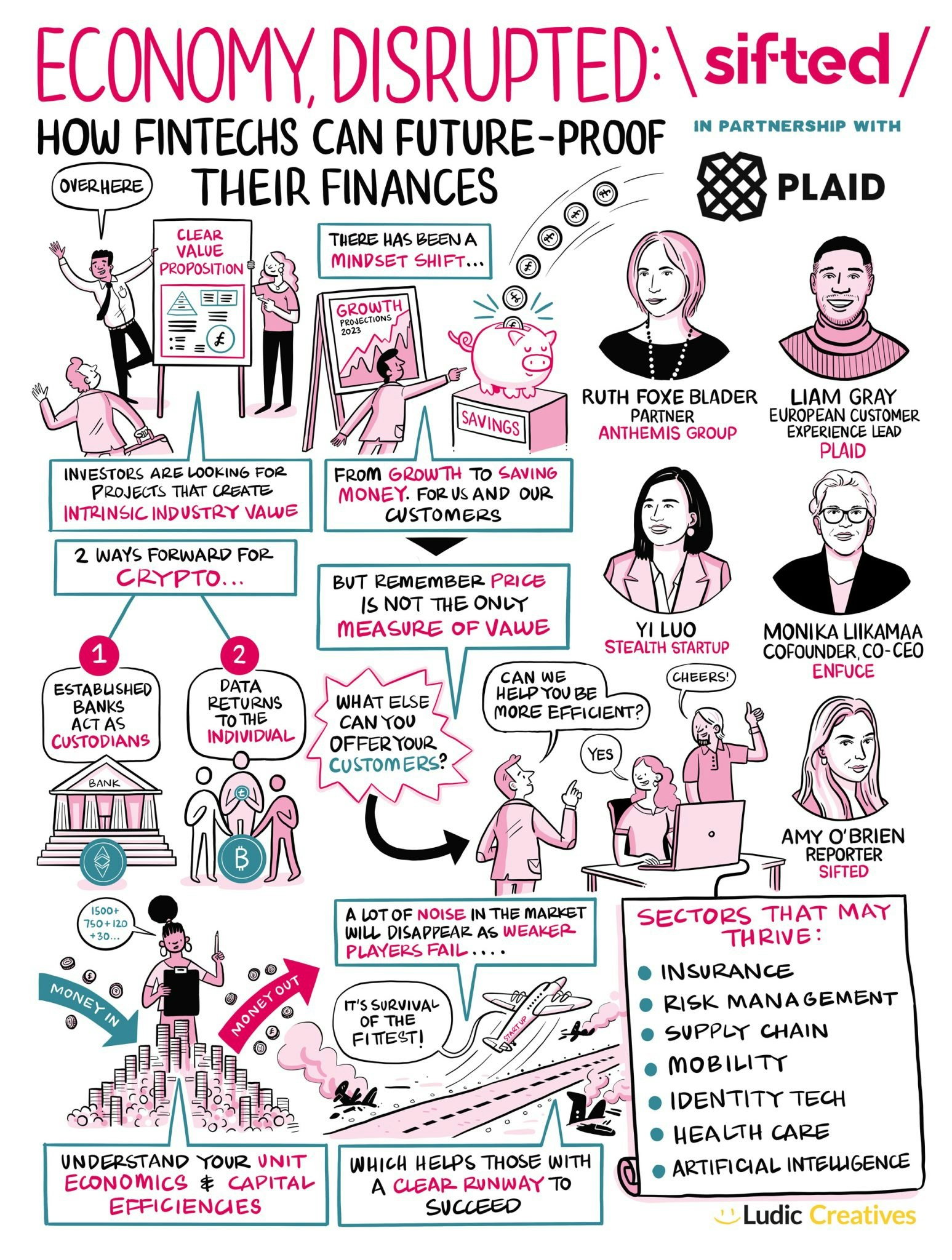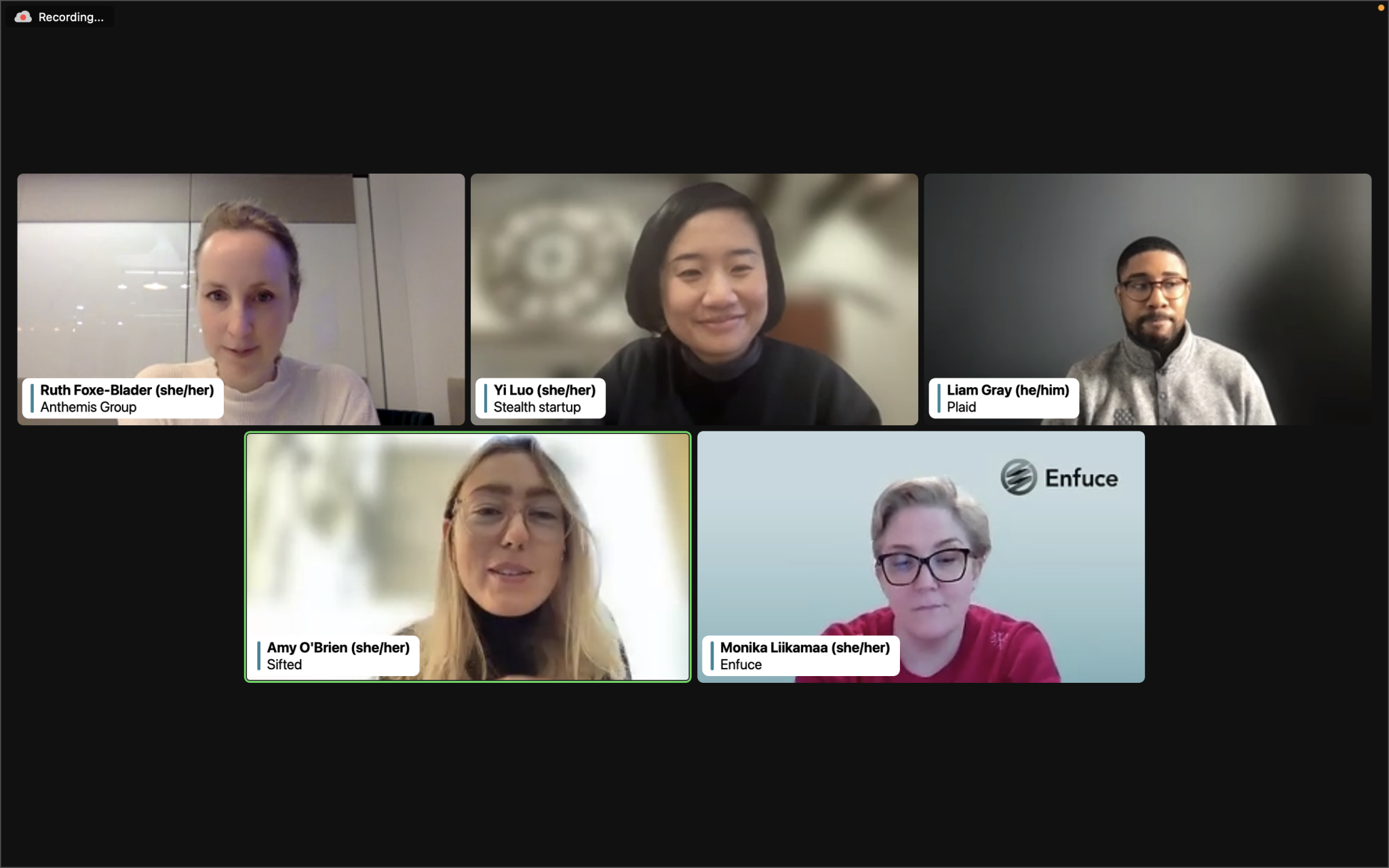2022 was a difficult year for fintech. Along with the rest of European tech, the sector has been washed over by the downturn, and the cost of living crisis has changed the motivations of consumers.
However, the slowdown presents opportunities for certain subsectors. Which specialisms are well placed to capitalise on the state of the market? And what role do VCs play in protecting their investments from macro trends?
We put these questions to a panel of experts on the latest edition of Sifted Talks. Our guests included:
- Liam Gray, growth account manager at Plaid
- Yi Luo, cofounder and CEO of a stealth startup in the crypto space
- Ruth Foxe Blader, a partner at VC firm Anthemis, specialising in fintech and insurtech
- Monika Liikamaa, cofounder and co-CEO of Finnish payments provider Enfuce

1/ Consolidation offers opportunities for startups
The panel started with the four speakers agreeing there had been a mindset shift among both companies and investors.
Foxe Blader said that investors had become more reluctant to spend — especially on post-Series A fintechs that haven’t demonstrably proven market fit. However, macroeconomic trends have had less of an impact on seed-stage businesses' ability to garner investment.
Within startups themselves, there's been less focus on growth at all costs. At Enfuce, greater focus has been put on improving the unit economics of the business and their clients. At Plaid, focus has gone from how open banking can facilitate growth to looking more at how it can save costs.
But the panel agreed that this does open up opportunities, especially in industries where the downturn has had a significant impact. For example, Luo said that the recent tribulations in the crypto market had made the path to market fit clever. Those businesses that can re-establish trust following the FTX scandal and market crash — and have “laser-focus” on the issue at hand — have the opportunity to scale quickly.
The biggest issue in the industry is trust. As we all come from the fintech and finance background, we know that trust and confidence is so fundamental for the industry” — Yi Luo, CEO of a stealth startup
2/ Investors musn’t bring panic to the boardroom
There was spirited debate about the role investors played in the current plight of fintechs. Liikamaa suggested that the over-inflated valuations seen in 2021, and subsequent bursting of that bubble, can be attributed to the over-eagerness of investors to spend their cash in businesses that hadn’t proved product-market fit — the ramifications of which have made it harder for the market as a whole.
While Foxe Blader admitted there was some culpability on the part of VCs, she suggested it was too soon to be sure of the impact of the bullish investment levels seen in the latter stages of the Covid pandemic.
She called on investors to take a calm-headed approach over the coming months. VCs should offer emotional support, provide access to their networks and try to take as little involvement in the operations of their portfolio as possible. Crucially, they should avoid over-catastrophising about the impact of macro trends on their businesses.
Investors can really make a mess of things if they bring market panic into the boardroom… As an investor, I think one of the things that I can do is provide emotional support to companies” — Ruth Foxe Blader, Anthemis

3/ Subsectors that improve efficiencies can win big
When asked which subsectors will see the most innovation in the downturn, our panel was optimistic about the potential of insurtech.
Foxe Blader said insurance is generally "recession-proof", but also pointed out that there are inefficiencies in the industry. Liikamaa said that with both company and personal budgets being tightened, people will be much more specific in their spending — asking questions like “What am I paying for and what am I entitled to?”
How do we make a certain process more efficient, and also do it in a way that is good for the environment?... If you can have those things in line and tell the story and have the razor sharp focus, I think you're well equipped to come out a winner” — Monika Liikamaa, Enfuce
4/ There are opportunities for all fintechs to improve end users’ finances
While 2022 was difficult for all fintechs, B2B solutions still saw high levels of investment. The panel agreed that this was likely to continue, but there are opportunities for fintechs to improve end users' finances — either directly or indirectly.
Luo also said the increase in cost of living means B2C fintechs should rebound in 2023. Gray said that open banking could help both companies and individuals the opportunity to better manage their money. It may also help businesses pass on cheaper costs to their end users, as they can limit their expenditure elsewhere.
From a company standpoint, there's business financial management… It's something that can supplement other costs that end users and businesses have” — Liam Gray, Plaid
Like this and want more? Watch the full Sifted Talks here:


